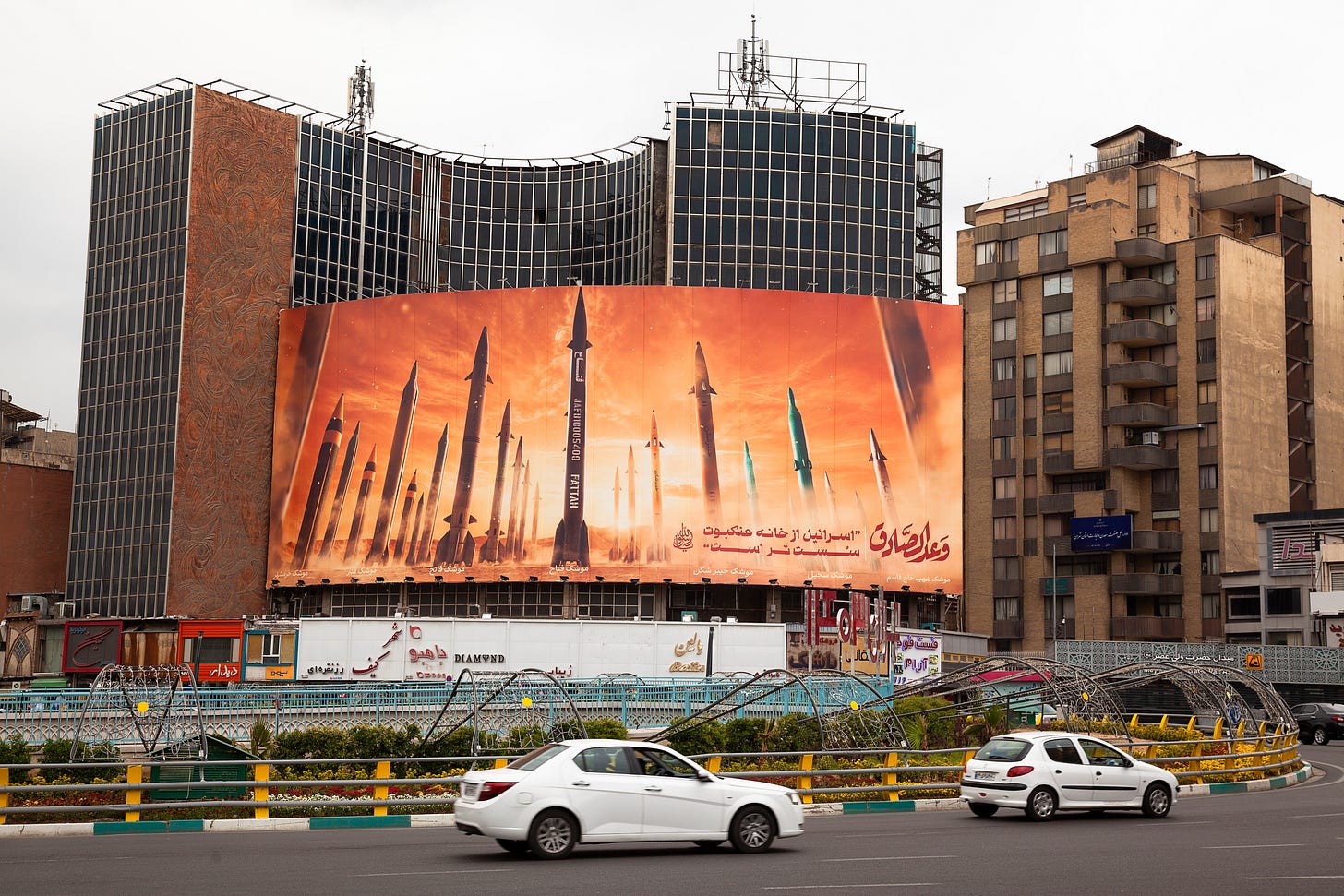Anatomy of A Preventable Proxy War
How America's Political Dysfunction Has Driven Israel-Iran Conflict
An Ill-Considered Deal
In the wake of the well-intentioned, but ultimately disastrous US-NATO intervention to protect Benghazi residents from Mu’amar Gaddafi in 2011, President Obama sought a lasting Middle East legacy — not in a peace accord between Palestinians and Israelis (dismissed early on as too difficult), but an “absence of war” between Iran and Israel. Israeli Prime Minister Benjamin Netanyahu long referred to Iran’s nukes as an existential threat to Israel, and agitated for American action against the Islamic Republic— hinting he would act alone if need be.
The Obama administration responded by negotiating 2015 the Joint Comprehensive Plan of Action (JCPOA) or “Iran Deal,” which was to limit Iran’s progress towards an operational nuclear weapon a number of years, in return for sanctions relief.
The flaw of the JCPOA was not the text, per se (the deal’s non-political focus was a selling point), it was the Obama administration’s aversion to doing anything it perceived might cause Iran to abandon that deal, including push back on Iran’s growing support for established military proxies in Lebanon (Hezbollah), Gaza (Hamas), Yemen (the Houthis), and Iraq (Pro-Iran, Shi’a militias). This was a serious mis-apprehansion of Iran’s internal conditions and motives.
The toxic, multi-year partisan melee over the 2012 Al Qaeda attack against the US mission in Benghazi had deepened the climate of risk aversion in Washington, which, in the words of several high-ranking U.S. diplomats constituted a devastating blow to American diplomacy in the Middle East. Benghazi was the social media-era version of political recriminations that followed the 1992 “Black Hawk Down” incident in Somalia, and the 1983 Marine Barracks Bombing (one of whose planners Israel killed this week in Lebanon).
The Iranian regime needed the JCPOA, which it saw as critical to its economic health and domestic political stability: when Trump took the U.S. out of the JCPOA in 2018, Iran tried its best to keep the agreement alive through its other signatories (revealing the value it placed on it).
Progressive Failures:
Had the United States not overthrown Saddam Hussain in 2003, deepening Iran’s influence in that country; had it worked harder to prevent Syria and Iranian arming of Hezbollah in the late 2000s (in line with then-Secretary of Defense Robert Gates’ warnings), or realized the Houthi threat in Yemen in time to prevent its takeover of Sana’a (the Iranians allegedly denied the Houths assistance as late as 2011), and had Netanyahu not chosen to try to divide Hamas and the Palestinian Authority to the advantage of Israeli West Bank settlers by supporting Hamas financially through third parties (i.e., Qatar), we’d be seeing a very different reality today.
Hamas’ military commander — now leader— Yahya Sinwar constructed the 10/7 attack on Israel to provoke a disproportionate response, and massive civilian casualties. He believed this was necessary to stoke international outrage against Israel, while the political recriminations within Israel regarding the fate of the 200 hostages in Gaza pit Israelis against one another – and Netanyahu.
A Sudden Change
A couple of months ago, the Iranian leadership was undoubtedly gloating at how much flack Israel was taking for its extremely high body count in Gaza. But Netanyahu, whose moral transgressions and self-serving justifications are comparable to those of the groups he is fighting, has managed recently to turn the tables— at least for the moment, and dramatically so.
Sinwar almost certainly counted upon Netanyahu’s being constrained by the Israeli commitment to expend extraordinary efforts to retrieve hostages and the fallen — the same calculus that resulted in Sinwar’s release in 2011 as part of a lopsided prisoner swap of 1000 Palestinian prisoners for a single Israeli hostage.
By not only refusing to negotiate, but actively frustrating efforts to do so (including new demands, such as Israel’s occupation of the Philadelphi Corridor separating Gaza from Egypt) the Israeli PM has infuriated many Israelis and left Sinwar — and the remaining hostages — underground in Gaza with no clear next move.
Netanyahu seems to believe he can pivot public concern from the hostages to the plight of the 100,000-odd Israelis evacuated from their homes in Northern Israel by Hezbollah attacks.
The fact that a ceasefire — which is what Netanayhu was supposed to conclude — would likely at best have returned only some of the hostages, without ending the war, is a moral consideration dismissed by those who want only good news — including mainstream US media. Last Friday CNN anchor Fareed Zakaria wrote that the US had been “close” to brokering an Israel-Hamas deal (the implication being - before Netanyahu went off-script). There is very little to suggest this was ever the case, as the US has consistently shown unwillingness to apply the level of pressure needed to broker any meaningful deal in the ramp-up to a deeply contested election.
Similarly, Israel deeply embarrassed the Iranian regime by assassinating Hamas’ then-political leader Ismail Haniyeh in an IRGC guest house in the heart of Tehran in late July. Next, Netanyahu initiated a hybrid surgical strike-plus-cyberattack by booby-trapping thousands of Hezbollah pagers, killing 30+ and maiming some 3000. This was followed with a strike on a building in South Beirut that removed much of Hezbollah’s command structure. Israel has also bombed Houthi positions in Yemen, including their main port on the Red Sea at Hodeidah, which while it will continue to impact food aid entering into war-torn Yemen, will also constrain Houthi revenues and military capacity.
This Wasn’t What We Expected….
Like Hamas and Hezbollah, Iran must balance the pros and cons of both a response — and the lack of one.
As for Iran’s status as a nuclear power, we are unlikely to see any upgrade before the U.S. election. Arguably the main value to Iran of its nuclear program is as a bargaining chip with which to re-negotiate the JCPOA and gain immediate sanctions relief. Furthermore, Iran must assume the chances of that are far better under a Harris, than a Trump presidency. That poses another constraint to action.
What next? Whatever the morality of the actions taken by Israel in the last weeks, Israel has gained considerable new leverage, which in itself is valuable. The only real influence on the direction of that influence currently is the U.S. But there is no clear indication that either President Biden or Harris is willing to intervene strongly, either before — or after the election. If Trump is elected, a deal may be in the offing — but the biggest near term losers will almost certainly be the Palestinians.
Another Chance to Shift the Tracks (Which We Will Probably Miss):
To take advantage of the shifting balance of power, and to maximize her electoral chances, VP Harris would do well to show, quickly, that she is willing and capable to do the kinds of things to contain and manage this conflict that Biden has been unwilling to, i.e., to put all offenders on notice, while reaffirming America’s support for the Israel.
Iran has a choice — sanctions relief, or walking away from its regional proxies. Harris might go as far as to say that, if elected, she will hold Iran ultimately responsible for the safety of the Israeli hostages held in Gaza.
While unlikely to happen, this would put the US in the position of advocating for the Israeli people – as distinct from their current government, which many Israelis feel has betrayed them.
Rather than not say anything, Harris would also do well to use pressure on Iran, as cover to provide tangible details prior to the November election (See past posts for a description of a Gaza First strategy, which has been floated quietly by a some informed Israeli and Palestinian sources) on how she intends to use American power to advance the cause of a Palestinian state, in a manner consistent with Israeli security issues.
This would logically be done within the context of a broader Arab-Israeli alignment against Iran, including Saudi Arabia. Saudi Arabia’s Crown Prince MBS has reiterated recently that any Israel-Saudi peace is contingent upon provisions for a Palestinian state).
While all of these are speculative and highly optimistic scenarios, the alternatives are bleak.
Some of the most difficult challenges a President Harris would face will be how to reverse pervasive risk aversion; rebuild American professional foreign policy and national security bureaucracies after decades of erosion and politicization, and re-articulate what America stands for, at home and abroad.




I want to echo you especially on what you said in the last paragraph regarding the most difficult challenges to be faced by Harris as the new president. While the US still remains at the top, its global power is diminishing and in the increasingly multipolar world (or at least moving in that direction) the US foreign policy needs to change.
i concur. another great post. all kinds of trenchant observations on the world’s viper nest. what are the roots of Iran’s enmity for Israel. i know so little about the region, but of all the countries that would like to see Israel erased from the map, why do they seem the most determined?